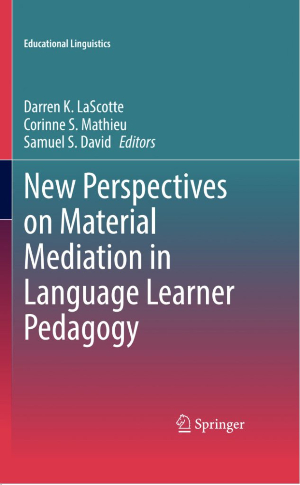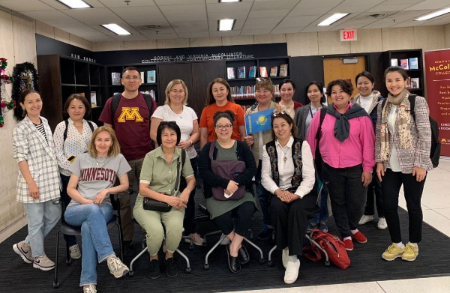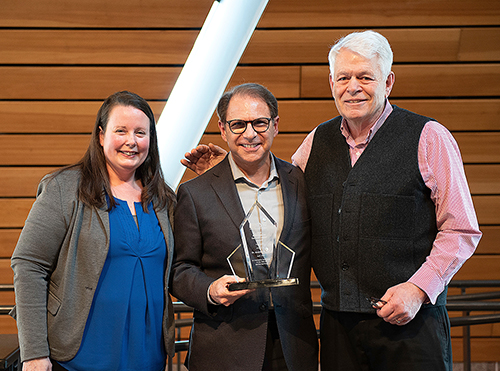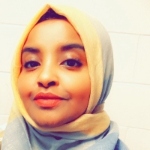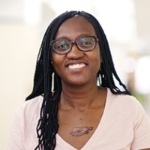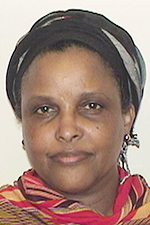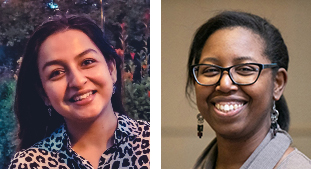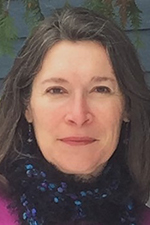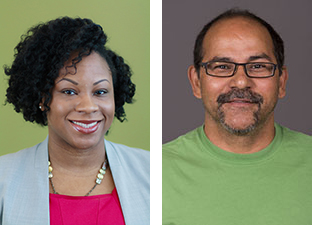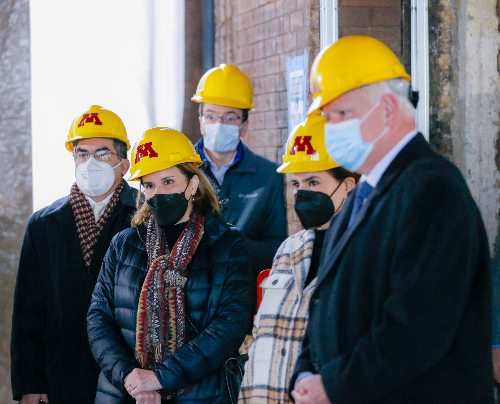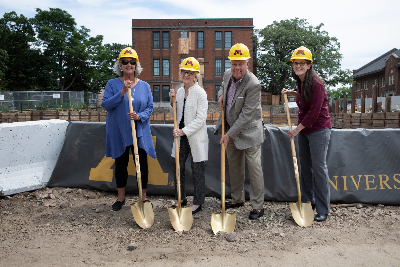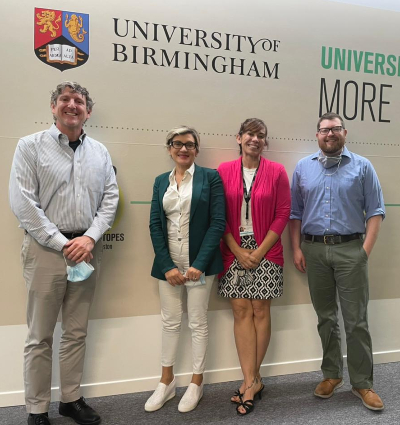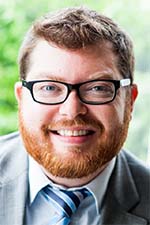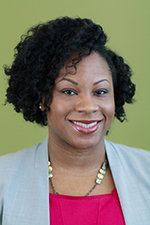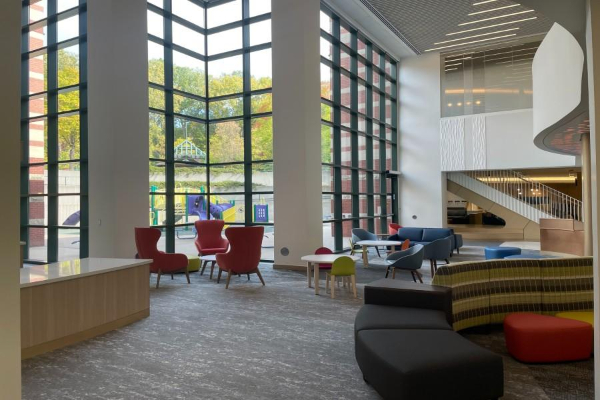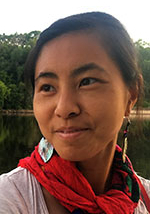At the 2022 Spring Assembly, CEHD saluted those faculty and staff members who are leaving us. We thank them for their service and wish them well in the next chapter of their lives.
Judy Cook, a valued research staff member in the Institute of Child Development, will retire on April 29. She has devoted her 30-year career to two research studies at the University of Minnesota: The Minnesota Longitudinal Study of Risk and Adaptation, and the Minnesota Twin Registry. Judy holds much pride in being associated with both studies. She is thankful for having known many good people along the way, and has especially enjoyed seeing graduate students make their way through grad school and go on to have stellar careers. Judy plans to spend more time with family and friends in retirement, and travel–especially up to the north shore, one of her favorite places.
Mark Davison will retire as a professor in the Department of Educational Psychology Quantitative Methods of Education in May after 48 years at the University. His research interests include educational measurement, scaling (particularly multidimensional scaling) and the assessment of growth in educational settings. He is a fellow of the American Psychological Association and the American Educational Research Association, author of Multidimensional Scaling, editor emeritus of Applied Psychological Measurement, an editorial board member for the Journal of Adult Development, past-president of the American Psychological Association Division 5, former chair of the association’s committee on psychological testing and assessment, and former co-director of the Minnesota Interdisciplinary Training in Education Research Program.
Robert delMas will retire as an associate professor of educational psychology in quantitative methods in education in May after 30 years at the University. His primary research focuses on the study of educational experiences that promote conceptual change and development and the assessment of conceptual understanding. He has been a co-PI with other leaders in statistics education on five projects funded by the National Science Foundation and served as an adviser to other NSF-funded statistics education projects. He also served as a member of the Research Advisory Board of the Consortium for the Advancement of Undergraduate Statistics Education and as an advisor to the Carnegie Foundation for the Advancement of Teaching StatWay project. He is a Fellow of the American Statistical Association and served as the chair of two of its committees on statistical education. His distinguished work in teaching has earned him a University of Minnesota University College Distinguished Teaching Award in 1997 and the CEHD Distinguished Teaching Award in 2016.
Currently the foundation professor in the department of psychology at Arizona State University, Abi Gewirtz was the inaugural director and founding faculty member of the Institute for Translational Science for Children’s Mental Health in CEHD. Abi has spent her career working to understand and help families who are under stress. In addition to her academic publications, she is also the author of “When the World Feels like a Scary Place: Essential Conversations for Anxious Parents and Worried Kids,” which is a timely and practical guide for parents on how to talk with their kids. Abi was also my mentor to full professor.
A highly recognized expert on Minnesota fish, Associate Professor Jay Hatch has devoted his professional life to two core endeavors: understanding the aquatic biology of the Upper Midwest and sharing his ecological knowledge with University undergraduates through a perpetually sold-out experiential learning field study course, called “Nature in the City.” He will retire in May. Many of Jay’s students over the years have become elementary school teachers, and he has been a beloved co-teacher for his colleagues whether through first-year learning communities or through his study abroad course in Akumal, Mexico. Jay joined the General College many years ago (which is when he and I first became colleagues), and in 1998 he became part of the Academy for Distinguished Teaching Professors as a recipient of the Horace T. Morse-Alumni Award which is the highest honor for undergraduate teaching at this University. He has been a highly ranked Morris dancer for longer than that, and his penchant for shameless word play has made him one of our most pun-derful colleagues.
Lori Helman is a professor in curriculum and instruction and has been the director of the Minnesota Center for Reading Research at the University. She retired in January. Lori is an elementary teacher, a teacher educator, a researcher, and an author. Her areas of interest focus on reading difficulties, effective teaching practices for multilingual students, and the implementation of school-wide systems of support. She is an international leader in literacy research and policy. For example, Lori served as a member of the International Literacy Association’s Standards 2017 Committee and was instrumental in revising the national standards for reading teachers and literacy professionals. Lori also received the Jerry Johns Outstanding Teacher Educator in Reading award from ILA in 2016. Lori has had a significant impact in the state of Minnesota through her teaching and advocacy work, including the Higher Education Literacy Partnership, Leaders in Reading Network, and Path to Reading Excellence in School Sites.
Beth Magistad is retiring in May after almost 20 years as the director of the Parent and Family Education program in the Department of Family Social Science (FSOS). She is a fierce advocate for parents and families across Minnesota. During her tenure as director, she led a complete revision of the fully online program. She is: a master teacher, a critical leader on the FSOS undergraduate curriculum redesign committee, and a sought out across the country for her expertise in teaching pedagogy and scholarship.
Scott McConnell, a professor in the Department of Educational Psychology, will retire in May. He came to the U of M in 1986 as an assistant professor in the program then called Psychology in the Schools Training Program. He was promoted to Associate Professor in 1989 and Full Professor in 1995. Since joining the University, Scott has been part of the School Psychology and Special Education programs, and held the Fesler-Lampert Chair in Urban and Regional Affairs. Past appointments have included directing the Institute on Community Integration and the Center for Early Education and Development. At the University, he has served on the Senate Research Committee, an ad hoc Grants Management Redesign Committee, and the University Northside Partnership Oversight Committee. His research focuses primarily on preschool-aged children, and the skills and competencies that will enable them to learn and participate in school and other settings. Most recently, he has been working with U colleagues and commercial organizations to foster broader dissemination of research-based practices and procedures that help improve young children’s academic success.
Megan Morrissey has a long history at the School of Social Work as a student, administrator, and educator. She will retire after 30 years of service in May. Megan completed a Master of Social Work degree in 1987 and PhD in 1997, both from the School of Social Work. In addition, she held three key leadership positions beginning with director of MSW admissions from 1992 to 1999, followed by director of the MSW program from 1999 to 2021, and associate director of the school since 2007. Trained as a social welfare historian, Megan has taught required history courses in the master’s and doctoral programs as well as courses in social welfare policy and social work macro practice and community organizing. Megan has been actively involved in local and national professional organizations such as the National Association of Social Workers, the Council on Social Work Education, and the Minnesota Conference on Social Work Education, where she served as president for two terms. One of Megan’s most notable accomplishments during her tenure was to successfully lead the school’s MSW program through four accreditation cycles, most recently in 2021. She plans to spend her retirement years outdoors, hiking, biking, kayaking, and skiing.
Jean Quam was professor and former dean of CEHD. She retired in January 2022. Jean joined the School of Social Work as an assistant professor in 1980. Over the course of her career that has spanned more than four decades, she established a sterling legacy as a faculty member, researcher, academic leader, and social work educator. Jean’s scholarly work has focused on social work practice with older adults, and particularly on the needs of aging GLBTQ-identified persons. In 1991, she became director of the school and went on to raise funds for the school to move into its own building on the St. Paul campus. Under her leadership, the school established distance education programs around the state and built a strong portfolio of endowed scholarship funds. In 1992, Jean and Professor Esther Wattenberg created the school’s Center for Advanced Studies in Child Welfare. In 2006, after 16 years as director of the School of Social Work, Jean agreed to serve as the senior associate dean in the University’s newly reorganized “New College of Education and Human Development,” which became the academic home for the School of Social Work. Two years later, she was appointed Dean; a position in which she served for over 11 years. Jean stepped down from her role as collegiate dean in 2020 and returned to a position on the social work faculty. During her tenure as dean, she raised over $100 million for the college, secured funding from the legislature to construct a new building for the Institute of Child Development, combined a developmental child care center with a laboratory school and secured funding for a renovated building, and worked with the Medical School to establish the Masonic Institute for the Developing Brain. She also built the most diverse faculty and student body at the university. Jean has also served in leadership roles for several prominent social work organizations, including the National Association of Social Workers, the Society for Social Work and Research, the Council of Social Work Education, and the National Association of Deans and Directors of Schools of Social Work. Jean continues to stay connected to the School of Social Work and remains active in the social work community.
Karen Seashore, a Regents Professor and the Beck Chair of Ideas in Education in the Department of Organizational Leadership, Policy, and Development, will retire in May. During her time at the U, she was active in service to CEHD as department chair, associate dean, director of CAREI, and the inaugural director of undergraduate education in OLPD. In 2010, she was appointed as a Regents Professor. National and international recognition of her work includes election as vice president and senior fellow of the American Educational Research Association, along with lifetime achievement awards from the University Council for Educational Administration, Division A of AERA, the International Congress for School Effectiveness and Improvement, and the National Staff Development Council (now known as Learning Forward). She also received both excellence in teaching and advising awards from CEHD. She is most proud of the 85 PhD students whom she advised to completion during her career. She now resides in Boulder, Colorado, but is knitting a maroon and gold scarf.
Throughout her 34-year career as a professor and Extension specialist in the Department of Family Social Science, Marlene Stum has been a tireless advocate for aging families . Her work is in the areas of: financial decision-making in later life, family inheritance, and family financial exploitation of elders. Marlene is the creator and author of “Who Gets Grandma’s Yellow Pie Plate?” a sought-after curriculum and set of resources to help families make fair and just decisions about inheritance and estate planning. Marlene is a fellow in the Gerontological Society of America and has won numerous awards for her research and engagement work on financial decision-making and financial security in later life. She is retiring this June.
Diane (Dee) Tedick is a professor in the Department of Curriculum and Instruction. She will retire in May. Her career has been defined by excellence in teaching, advising, and program development as well as by a deep commitment to supporting multilingualism and linguistic diversity in schools and society. Her international standing as a world expert in dual language and immersion education has drawn students to CEHD from around the globe. Her award-winning research, outstanding program development efforts, and deep engagement with her students’ work has made a lasting impact on so many individuals as well as on the broader field of immersion and language education.
Mark Umbreit is a professor and founding director in 1994 of the Center for Restorative Justice & Peacemaking at the School of Social Work. He will retire in May. Mark had been a doctoral student in social work at the University from 1985 to 1987, and then served as a research director in the Center for Youth Development and Research in the School of Social Work from 1987 to 1990. Mark joined the social work faculty as an assistant professor in 1990. He is an internationally recognized practitioner and scholar with more than 40 years of experience in the fields of restorative justice, mediation, spirituality, forgiveness, and peacemaking. In September of 2019, the International Association of Schools of Social Work recognized Mark among the 50 most notable social workers in American history, based on his global impact as a practitioner and scholar. He was also ranked among the 50 most influential contemporary social work faculty in the U.S. by the Journal of Social Service Research, based on the depth and range of his work as a practitioner and scholar. Mark will continue as co-director of the Center for Restorative Justice & Peacemaking at the University of Minnesota, Duluth.
Associate Professor Susan Walker is the longtime director of the Parent and Family Education program in the Department of Family Social Science and is a staunch advocate for parent education across the state. Susan is the creator of Parentopia, a web-based application that complements parent learning and engagement through Minnesota’s early childhood family education programs. In addition, she recently addressed the UN on digital technologies and families as part of the United Nations 59th Commission for Social Development.

